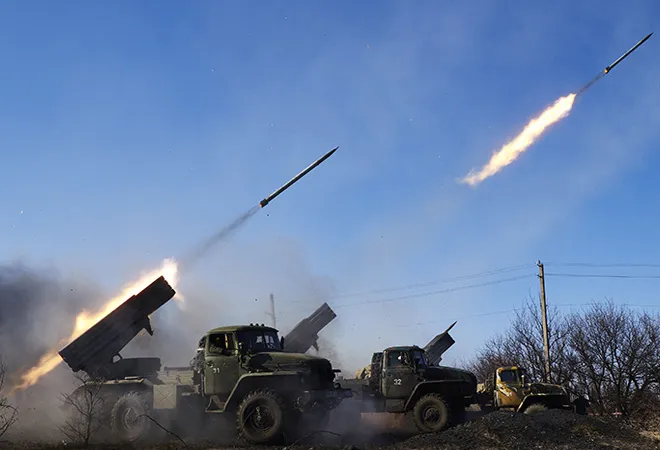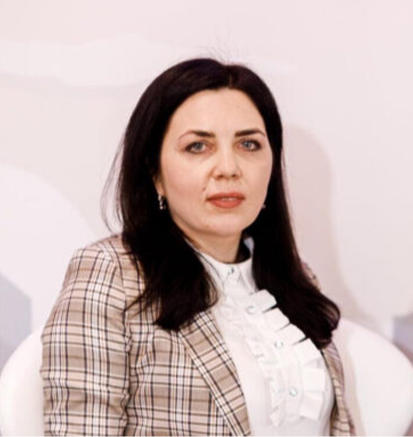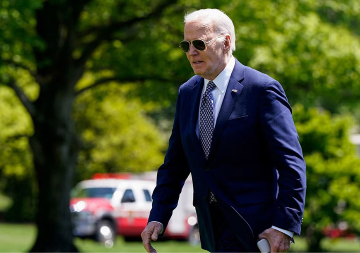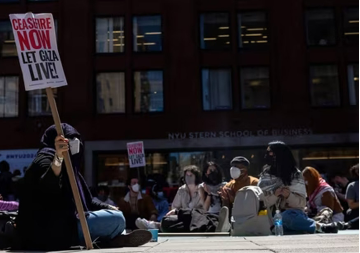
This brief is a part of The Ukraine Crisis: Cause and Course of the Conflict.
Russia has unleashed an unwarranted war against Ukraine. For several months, western intelligence warned of the possibility of a large-scale war. Many countries evacuated their diplomatic missions from Kyiv to Lviv, which is near the Polish border, although the Ukrainian authorities urged not to panic, hoping for a diplomatic solution of the problem. The Ukrainian society, too, did not believe that Russia would launch a large-scale attack on an independent sovereign state, but these hopes are now belied. The 24th February invasion began in the early morning when Ukraine’s population was peacefully asleep. Vladimir Putin announced the launch of a special military operation to “demilitarise and denationalise”. Rockets targeted large and small cities in all parts of Ukraine almost simultaneously. Some of them were sent from neighbouring country, Belarus. The Belarusian President Lukashenko has repeatedly assured the Ukrainian authorities that an attack from its borders is inadmissible, but clearly that is not the case.
Moscow and the puppet governments of the Luhansk and Donetsk regions made additional claims on Donetsk and Luhansk regions currently under Ukraine's control.
The Kremlin’s recognition of the independence of the Donetsk and Luhansk regions occupied in 2014 immediately after the visit of French President Emmanuel Macron was a sign of the failure of European diplomacy to appease Putin. Russia justified this recognition as the “desire to bring peace” to Donbass, which was facing “genocide”—propaganda that was actively promoted in the Russian media. To support this claim, the women and children of the Russian-occupied territories were evacuated to Russia’s Rostov-on-Don. Such a development allowed Russia to fabricate some grounds for invading Ukraine. Also, Moscow and the puppet governments of the Luhansk and Donetsk regions made additional claims on Donetsk and Luhansk regions currently under Ukraine's control.
After several days of fierce fighting, active rocket fire, and the advance of the Russian army from the north, east and south of Ukraine, it can be concluded that Moscow’s expected rapid capture of Ukraine has failed.
The failure to capture Ukraine swiftly has apparently led to the next step, with Putin threatening to use nuclear weapons. The Russian President has made it quite clear of the possibility of a nuclear war in central Europe against a country that had, in 1994, voluntarily renounced the world's third nuclear arsenal. The Russian Federation became one of the five countries that in return guaranteed Ukraine's sovereignty and territorial integrity. However, it was Russia, that violated that guarantee when it used the institutional crisis in Ukraine related to the escape of then President Viktor Yanukovych and occupied Crimea and part of Donbass in 2014. Russia is trying to justify its current aggression against Ukraine by linking it to threat from NATO. The Kremlin is actively promoting the narrative that the United States is trying to drag Ukraine into the bloc to pose a threat to the Russian Federation. It should be noted that NATO states, including France and Germany, in particular, restrained Ukraine’s desire to join the bloc so as not to spoil relations with Russia. And even after the Russian aggression in 2014, Ukraine failed to achieve clear signals about the prospect of accession to NATO.
The Kremlin is actively promoting the narrative that the United States is trying to drag Ukraine into the bloc to pose a threat to the Russian Federation.
Russia’s rhetoric about the threats seems strange, because it is Russia that has been waging war on Ukrainian territory for more than eight years. Moreover, during this time, Ukraine has not tried to reclaim its territories militarily. The Ukrainian society preferred a diplomatic solution to the conflict. The Ukrainian people also hoped that economic attractiveness would act as an incentive for the impoverished occupied territories to initiate a peaceful reunification. For this reason, the Ukrainian authorities have tried to maintain contact with these territories and paid pensions to the population, although this should have been the responsibility of the occupying power.
The current Russian attack on Ukraine is characterised by a complete disregard for international law and the UN Charter. Moscow is demanding a change in the government of the independent country, ignoring the fact that it has been democratically elected. Thuntries of the former Warse conditions imposed by Russia under the sight of the missiles are aimed at destroying Ukraine as a state. Vladimir Putin does not hide that he seeks to restore the erstwhile Soviet Union, as well as regain control over the coaw Pact. And for this he took hostage 42 million people demanding that it become part of the Russian space. However, according to sociological data from January 2022, 67.1 percent of the Ukrainians support joining the EU and 59.2 percent support joining NATO.
The Kremlin hoped to instil fear and panic amongst the civilian population by shelling residential neighbourhoods, kindergartens, schools, and destroying cities and villages.
The price for the Russian government from the aggression against Ukraine turned out to be unexpectedly high. Putin’s mistake was that he did not expect mass opposition from Ukrainian citizens. The Kremlin hoped to instil fear and panic amongst the civilian population by shelling residential neighbourhoods, kindergartens, schools, and destroying cities and villages.
The Russian military has already blown up several oil and gas stations, nuclear waste storage, and created an ecological catastrophe in Ukraine. The apotheosis is the seizure of the Chernobyl nuclear power plant, which the Russians are threatening to blow up. This is despite the fact that after the Chernobyl explosion in 1986, part of the Ukrainian and Belarusian lands became uninhabitable, and a large part of Russian territory received severe radiation damage.
Meanwhile, Ukrainian and Russian delegations held the first talks, which focused on finding common ground between the ceasefire and hostilities. But this did not defuse the situation, immediately after the talks, Kyiv and its suburbs were fired at with missiles.
Intimidation and military pressure are common Kremlin tactics. Especially, since Putin did not renounce the ultimate conditions, which he voiced during a conversation with Emmanuel Macron on the day of the talks. Amongst his demands are recognition of Russia’s sovereignty over Crimea, demilitarisation and denazification of the Ukrainian state, and ensuring Ukraine's neutral status.
The Russian army lost more than 5,710 soldiersand a large number of military equipment during these last six days, according to Ukrainian sources.
Tough sanctions, which have already affected the country's economic and financial systems, and Russia’s de facto international isolation are limiting Putin’s time. He needs to justify the Ukrainian adventure to the Russian elites and the population. The stakes are high, so the Russian President will try to force concessions through hard military coercion.
So far, the Russian side has failed to achieve a tactical victory, including the capture of Kyiv and other major cities in Ukraine. Unlike the Russian army, the Ukrainian army is very motivated to defend its own land. In two days, 100,000 Ukrainians joined the ranks of reservists. The Russian army lost more than 5,710 soldiersand a large number of military equipment during these last six days, according to Ukrainian sources. In addition to military resistance, Russian soldiers are facing resistance from citizens. There are many cases when unarmed people from villages and towns obstruct the movement of Russian military equipment and soldiers.
As of now, it is difficult to predict how this war will end and what its outcomes will be. They largely depend on the resilience of the Ukrainian army and its citizens. However, it is impossible to justify Russia's actions, no matter what arguments are put forward.
The views expressed above belong to the author(s). ORF research and analyses now available on Telegram! Click here to access our curated content — blogs, longforms and interviews.




 PREV
PREV


